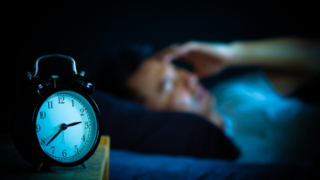Insomnia
The Powerful Link Between Insomnia and Depression
People with severe insomnia face a higher risk of developing many diseases.
Posted April 9, 2019 Reviewed by Davia Sills

When one has difficulty sleeping, the waking world seems opaque. On top of feeling tired and fatigued, those who experience sleep disturbances can be irritable and have difficulty concentrating.
With more severe cases of insomnia, one also faces a higher risk of developing heart disease, chronic pain, hypertension, and respiratory disorders. It can also cause some to gain weight.
Sleep disruptions can also have a major impact on one's emotional well-being. A growing body of research has found that sleep disturbances and depression have an extremely high rate of concurrence, and many researchers are convinced that the two are biconditional—meaning that one can give rise to the other, and vice-versa.
A paper that was published in Dialogues in Clinical Neuroscience concluded, “The link between the two is so fundamental that some researchers have suggested that a diagnosis of depression in the absence of sleep complaints should be made with caution.”
The paper's lead author, David Nutt—the Edmond J. Safra Chair in Neuropsychopharmacology at Imperial College London—found that 83 percent of depressed patients experienced some form of insomnia, which was more than double the amount (36 percent) of those without depression.
Bei Bei, D.Psych., Ph.D., from the Monash School of Psychological Sciences in Clayton, Australia, said the inverse was true, as well: “If a person does not currently have depression but goes through extended periods of time with sleep disturbances or insomnia, the sleep disturbances can potentially contribute to a mood disturbance or to even more severe depression.”
The Mechanisms Behind the Two Diseases
The sleep-wake cycle is regulated by what is known as the circadian process. When working properly, the circadian process operates in rhythm with the typical cycle of a day. One gets tired as the light of the day fades, and the body prepares for sleep. One awakes as it becomes light again. The internal mechanisms behind the circadian cycle involve a complex orchestration of the neurochemical and the neurophysiological presided over by the hypothalamus.
Depression, meanwhile, is a medical condition and a mood disorder. While there are several possible antecedents to depression, as genetic and environmental factors can lead to a depressive episode, the neurophysiological causes of depression pertain to a deficiency of chemicals in the brain that regulate mood: serotonin, dopamine, and norepinephrine.
However, these neurotransmitters do far more than just regulate mood. They have also been found to be integral to sleep efficiency. Disruptions in these brain chemicals can lead to disturbances in sleep, particularly REM sleep, and can also lead to more restlessness during typical times when one should be in bed.
This can create a vicious cycle wherein the more severe one's depression becomes, the more severe one's insomnia becomes. The inverse can also be true: The more severe one's insomnia becomes, the more severe one's depression becomes.
Evaluation and Treatment
Because these concurrent afflictions reinforce one another, medical professionals need to address both simultaneously for optimal treatment. However, there is not one cookie-cutter response that can eliminate both depression and insomnia. Many variables, including improper medication, can contribute to insomnia, and different symptoms indicate different causes, which is why it is important to provide your mental health professional with any information that can give them with more insight about your condition.
Describing your symptoms to your doctor allows them to narrow down the list of likely culprits and prescribe medications with greater precision. For example, letting your doctor know that you wake up in the middle of the night, and then have difficulties falling back to sleep, is a distinct symptom from having difficulties falling asleep in the first place.
Though depression and insomnia are commonly linked, they can be independent of one another. Then again, they may be part of a larger array of comorbid disorders that require specific treatment plans to resolve. To determine the best course of action, your doctor may recommend a sleep study, medication, or behavioral therapy.
Sleep Study
A sleep study is a test that measures how much and how well you sleep. During this test, you will be monitored by a team of sleep specialists who will be able to determine if there are any other disorders, such as restless leg syndrome or sleep apnea, that may be causing your insomnia. Even if the study does not reveal a definitive culprit, the sleep study will also allow your doctor to get a better picture of what is behind your insomnia.
Medication
Sleeping pills may help you fall asleep, but they are not long-term solutions to mental health. If you are suffering from a bout of insomnia that is related to a psychiatric disorder, you need to address that disorder to address your insomnia.
Oftentimes, this will require a treatment plan that includes a pharmaceutical component. This component will be unique to each patient, as there is not a one-size-fits-all regimen of medication for optimal mental health. Furthermore, there are numerous comorbidities with depression, such as anxiety, that may be contributing to your insomnia and that may not be resolved by certain types of anti-depressants alone.
Another potential treatment involves a combination of medication, light treatment, and melatonin, a hormone that helps regulate the circadian process. The conditions of patients who receive light therapy in conjunction with antidepressant therapy tend to show more improvement than those who are prescribed antidepressants alone. This is true for patients with seasonal and nonseasonal depression.
Cognitive Behavioral Therapy for Insomnia
In other cases, some mental health professionals may recommend you see a sleep specialist to receive cognitive behavioral therapy for insomnia. Cognitive behavioral therapy for insomnia (CBTI) involves numerous non-drug techniques to induce sleep, and it can be utilized before resorting to the use of pharmacological sleep aids with surprisingly good results.
Several studies have shown CBTI to be quite effective in treating insomnia and some forms of depression. A paper published in the Journal of Clinical Sleep Medicine in 2006 concluded that “The benefits of CBTI extend beyond insomnia and include improvements in non-sleep outcomes, such as overall well-being and depressive symptom severity, including suicidal ideation, among patients with baseline elevations.”
A paper published in the International Review of Psychiatry in 2014 found that CBTI may help with other comorbidities beyond depression. These include anxiety, PTSD, and substance abuse issues.
The National Sleep Foundation notes that this type of therapy can still be quite intensive. CBTI requires regular visits to a clinician for assessment, keeping a sleep diary, and, perhaps most importantly, the changing of behaviors that may feel as though they are firmly part of one’s routine. CBTI may also include some sleep hygiene education, where patients learn how different settings and actions can inhibit or promote sleep. It may also rely on relaxation training, where patients learn methods of calming their bodies and minds.
Concluding Thoughts
If you are struggling with either depression, insomnia, or both, treatments are available. The above studies demonstrate that there are holistic approaches, as well as pharmaceutical remedies, that can help induce sleep without the aid of sleeping pills. It is also a reminder that the most effective treatment plans are tailored to both the individual patient and the patient's concurrent illnesses.
LinkedIn and Facebook Image: Kleber Cordeiro/Shutterstock
Dr. Ahmad reports no conflict of interest. He is not a speaker, advisor or consultant and has no financial or commercial relationship with any bio-pharmaceutical entity whose product/device may have been mentioned in this article.




